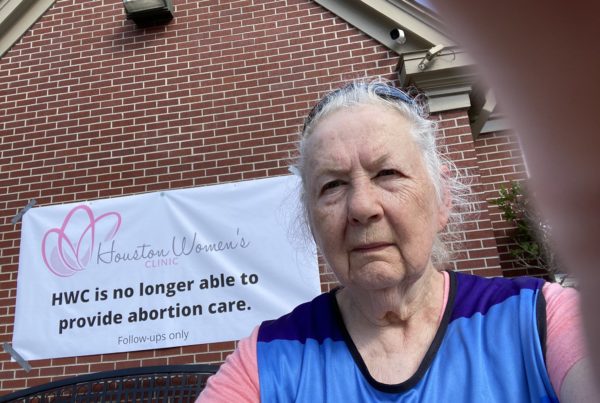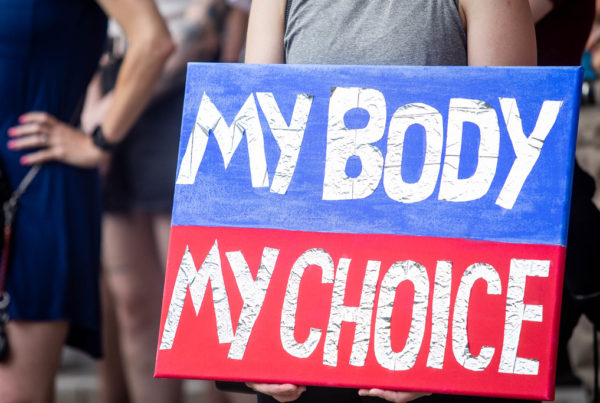In his concurring opinion to the U.S. Supreme Court’s opinion on Friday overturning Roe v. Wade, conservative Justice Clarence Thomas called on the court to also reconsider and overturn rulings that legalized contraception and same-sex marriage. Thomas said the court could do so by doing away with a doctrine called “substantive due process.”
Cary Franklin, the McDonald/Wright Chair of Law at the University of California, Los Angeles – where she’s also faculty director of the Center on Reproductive Health, Law, and Policy – joined Texas Standard to help explain the doctrine, and what it could mean for other cases. Listen to the interview above or read the transcript below.
» The Texas Standard wants to hear from you: Share your reaction to the Supreme Court’s abortion decision
This transcript has been edited lightly for clarity:
Texas Standard: Thomas pointed out three cases he thinks the high court should reconsider: Griswold v. Connecticut, Lawrence v. Texas and Obergefell v. Hodges. Griswold is contraception; tell us a little bit about the others.
Cary Franklin: Lawrence is a 2003 Texas decision that said same-sex couples have a right to intimacy – same-sex sex cannot be criminalized; it’s a constitutional right. Obergefell held in 2015 that same-sex couples have a right to marry.
As we mentioned, Thomas said he thinks that those rulings should be overturned by eliminating something called substantive due process. Take us back here – we’re talking about the 14th Amendment, if I’m correct.
Yes, the 14th Amendment was enacted after the Civil War, and among other things, it protected liberty and equality, but it didn’t list the liberty rights that were protected. It just said liberty is protected. So the court has subsequently interpreted that word ‘liberty’ to protect certain substantive rights, a lot of them having to do with sexuality, with family, with parents and children, with bodily autonomy. And Clarence Thomas doesn’t much like this doctrine. He is saying we should do away with this; the rights aren’t listed in the Constitution and he can’t find them there.
Yeah, there’s been a sort of a legal debate going back many, many years about whether the 14th Amendment intended to protect these liberties that are not specifically enumerated in the Bill of Rights. That’s been part of the debate, right?
Yes. Clarence Thomas believes that there are unenumerated rights in a different prejudice, you know, the 14th Amendment, the privileges or immunities clause. He’s imagining there’s a much narrower list of privileges, immunities. He’s an originalist. He wants to go back to asking, ‘what were the privileges and immunities you had as a citizen in 1868?’ And that’s all that’s protected.
He’s not in the majority on that. Most people think there are unenumerated rights protected under the Liberty Clause, but the majority here has adopted a very narrow test for what those liberties are. So even if you don’t do away with substantive due process, if you adopt such a limiting interpretation, I think Lawrence and Obergefell are vulnerable just as much.
Well, some people have said, are they really vulnerable? I mean, given the way that so many people now rely and depend on those rights – for their living arrangements, the fact that there are many people who are married right now, have kids living fruitful lives – pulling the rug out from under these individuals could be devastating, right? I mean, would the court do that? And how much of this is kind of alarmist talk?
You know, I really don’t think it is alarmist. And I’ll tell you why: We do consider a doctrine called stare decisis, which is the reliance interest that you’re talking about. The court thinks ‘if we took away this right, would it disrupt so many people’s lives in really dramatic ways?’ But we’ve just seen in the Dobbs case that the court is willing to take away half a century of women depending on the ability to choose for themselves when and if to expand their families. There was a pretty strong reliance interest in that context, and the court just yanked it out from people.
There was dicta in the majority opinion that seemed to suggest that this rationale only applied to abortion and should not be applied to other cases, like Griswold and Obergefell and Lawrence.
You’re absolutely right. And here’s the problem: The conservative justices have been advocating for the particular test that the court adopted in this case for a very long time. And the court adopted a test for substantive due process that said, is this right deeply rooted in American history and tradition? And they said, no, abortion is not deeply rooted in the history and tradition.
But the thing is, same-sex marriage is not deeply rooted in American history and tradition. So in the dissenting opinions in Lawrence and Obergefell, some of these very justices said we should apply this history and tradition test. And under this test, Lawrence and Obergefell come out differently.















